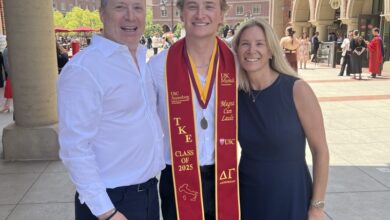Stream It Or Skip It?
Much could be/should be made about the surface-level strengths of The Wedding Banquet (now streaming on Paramount+): It’s director Andrew Ahn’s follow-up to his well-received 2022 comedy Fire Island. It stars Killers of the Flower Moon Oscar nominee Lily Gladstone, underrated Star Wars alum Kelly Marie Tran and beloved SNL breakout Bowen Yang. And it’s a remake of Ang Lee’s 1993 classic of the same name. But the real reason you should watch this by-turns light-to-mediumweight earnest dramedy? Terrific supporting performances by Joan Chen of Twin Peaks fame, and Youn Yuh-jung, unforgettable Oscar winner for her role in 2021’s Minari.
The Gist: “I hope the baby has your eyes.” “You know it’s not my sperm.” “I can still hope.” Oh. MUH god. These two are such a cute couple: Lee (Gladstone) and Angela (Tran). Neither, you’ll note, can produce sperm. That’s the joke. Lee so very much wants to give birth and raise the child with Angela. They’re on their second in-vitro try. It doesn’t take. Do they have the emotional fortitude to try a third, likely final, time? Probably. But their bank account has had enough. Now what? Is having each other enough? Maybe. They do seem fully committed to their love. But what if there’s a nutty sitcom solution that may help this problem? Hm. There’s the general wisdom that nutty sitcom solutions tend to make things worse, but to not try seems foolish. There are big-time dreams and yearnings at stake.
Before we get to the nutty sitcom solution, we need to meet Lee and Angela’s closest friends, Chris (Yang) and Min (Han Gi-chan). They’re another totes-adorbs couple, and they live in Lee and Angela’s guest house (although “guest house” seems too fancy, but “garage” is too not fancy). Five years they’ve been together, and nobody’s questioning their love or commitment either. Of course, there’s a complication. They are alive in reality, where there’s always a complication, whether you’re a real human on this side of the screen or a fictional movie character. Min comes from an extremely rich family, and is the heir of a massive corporation whether he wants to be or not. His U.S. visa is about to expire, and his grandmother Ja-Young (Youn), who raised him after the death of his parents and doesn’t know he’s gay, would rather he return to Korea and assume the mantle of the family business instead of apply for an extension. Min’s solution? Propose to Chris, who doesn’t see being a green-card ticket as particularly romantic. And on top of that, he doesn’t want to be responsible for Min losing his inheritance and his family, because Min’s homophobic grandfather would disown him. This is entirely reasonable, and not the nutty stuff of sitcoms.
But when are we getting to the nutty sitcom shit?, you’re no doubt asking. Well, here’s your answer, fishbulb: Min will marry Angela, and in exchange, he’ll use a bit of his mountain of money to foot the IVF bill. Deal! Now WHAT, I must ask, COULD POSSIBLY GO WRONG? Well, what if grandma Ja-young flew in for a surprise visit, prompting a frenzied last-minute attempt to “de-gay” Lee and Angela’s home so it looks like Angela and Min’s One Hundred Percent Heterosexual Love Palace? That happens, and inevitably, the situation gets thorny when complicated feelings get hurt and strewn about, and old family pains rear their ugly heads, e.g., Angela’s mother, May (Chen), an attention hog who just won an award for LGBTQ advocacy despite their temporary estrangement when Angela came out to her. You know what else happens? Ja-young sees through this bullshit ruse and calls everybody out, and all the other characters and you and I and everyone else watching gets a little tingle when this plot doesn’t proceed as expected.

What Movies Will It Remind You Of?: The Wedding Banquet nestles somewhere between The Birdcage and Crazy Rich Asians – and prompted me to remember how hard I laughed at the former when I first saw it in 1996.
Performance Worth Watching: We should credit the screenplay for taking a surprise turn or two, but Youn absolutely sells it, refusing to adhere to a single iota of the strict-Asian-elder stereotype. She anchors two scenes that all but make the movie, delivering an understated, deeply sincere speech to Han, and sharing a perfectly calibrated and acted scene with Chen, both making the absolute most of their limited screen time.
Memorable Dialogue: Chris and Angela tear around the house hiding anything that might betray the gay – and get to the Lilith Fair poster:
Angela: I don’t think Min’s grandmother will know that’s lesbian.
Chris: The Indigo Girls are surprisingly popular in Korea!
Sex and Skin: A brief glimpse of Yang’s buttocks.

Our Take: Ahn – co-writing with James Schamus, who helped script the original Wedding Banquet – pulls off a tricky tonal maneuver here, sprinkling elements of broad comedy into what’s essentially an earnest mediumweight relationship drama. The result is occasionally uneven, but it’s ultimately functional and endearing, any potholes smoothed over by the game-for-anything cast, who deliver a few moments of spirited comedy and establish and embellish the screenplay’s emotional poignancy. I so wished it made better use of Gladstone’s disarming screen presence – she fades into the periphery during the final act – but it’s ultimately a film whose flaws are eclipsed by its robust heart.
There’s a bit of clutter to sift through – borderline-wacky comedy tied to plausible mishaps, all generally endearing, because nothing here feels forced or unearned – before we suss out the core theme here, namely, LGBTQers managing and reckoning with the families they were born with and those they’ve created, or “found.” The plot weaves in and out of the central ruse in an amusing fashion, Ahn finding a way to work a Moment of Unfortunate Vomit into a respectful, often beautiful depiction of classical Korean wedding traditions.
The script is nicely calibrated to balance heartfelt moments (delivered with crucial poignancy by Chen, Youn and Gladstone) with big laughs (a Big Lebowski reference, a joke about “penis sperms” and “test tube sperms”), all well-timed for dramatic impact and comic relief within the greater arc of the screenplay. The overall result is a touch disheveled, but it feels more true than contrived – there are no dyed-in-the-wool antagonists here, just people trying to do their best during difficult circumstances – Ahn reflecting the messiness of his characters’ lives, and finding considerable agency within them. Family is the key word here, in all its pains and joys, and if The Wedding Banquet embraces any overarching philosophy, it’s the warmth of anti-isolationism. Staying together through tough times makes us better people, the film quietly asserts, a persuasive and hopeful sentiment.
Our Call: The Wedding Banquet is as emotionally intelligent as it is entertaining, a relative rarity among comedies. STREAM IT.
John Serba is a freelance writer and film critic based in Grand Rapids, Michigan.
Credit to Nypost AND Peoples



